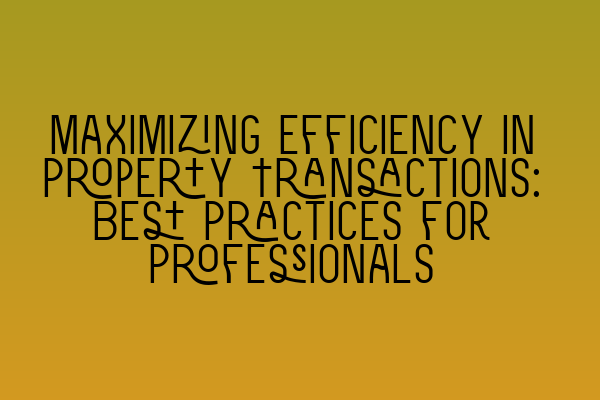Maximizing Efficiency in Property Transactions: Best Practices for Professionals
In the fast-paced world of property law, efficiency is the key to success. With tight deadlines, complex legal processes, and high stakes involved, it is essential for professionals in the field to adopt best practices that can streamline property transactions and maximize productivity. In this blog post, we will explore some essential tips to help you optimize your workflow and deliver outstanding service to your clients.
1. Embrace Technology
One of the most significant advancements in the legal industry is the integration of technology into daily operations. By leveraging technology tools and software, professionals can automate repetitive tasks, manage files electronically, and improve communication with clients and counterparties. Consider adopting a comprehensive practice management system that centralizes all your files, documents, and communication channels in one place. This can significantly reduce the time spent on administrative tasks and allow you to focus more on the legal aspects of the transaction.
2. Maintain Open Communication
Effective communication is the foundation of any successful property transaction. Stay in constant contact with your clients, agents, and other professionals involved in the process. Promptly respond to emails, return phone calls, and utilize video conferencing tools when necessary. Regularly update your clients on the progress of their transaction and ensure that they are well-informed about any potential issues or delays. By fostering transparent and open communication, you can build trust and establish yourself as a reliable and efficient professional.
3. Streamline Documentation Processes
Property transactions involve a significant amount of paperwork and document management. To maximize efficiency, develop a standardized approach to handling documentation. Create templates for commonly used documents such as contracts, leases, and conveyancing forms. Utilize e-signature software to obtain signatures electronically, reducing the need for physical paperwork. Additionally, regularly review and update your document templates to ensure they comply with the latest legal requirements and best practices.
4. Collaborate with Others
Collaboration is key in the property law industry. Engage with other professionals, such as real estate agents, surveyors, and mortgage brokers, to foster a collaborative approach to transactions. Building a strong professional network can help you access valuable resources, gain insights, and expedite processes by sharing information and expertise. By working together, you can collectively enhance your efficiency and deliver exceptional results to your clients.
5. Stay Up-to-Date with Legal Developments
Property law is constantly evolving, with new laws, regulations, and precedents emerging regularly. It is crucial for professionals to stay updated with the latest legal developments in the field. Subscribe to industry-specific publications, attend relevant webinars and seminars, and join professional associations to stay informed. By staying up-to-date, you can provide accurate and timely advice to your clients, avoid potential pitfalls, and ensure compliance with the law.
In conclusion, maximizing efficiency in property transactions requires professionals to embrace technology, maintain open communication, streamline documentation processes, collaborate with others, and stay up-to-date with legal developments. By adopting these best practices, you can optimize your workflow, enhance client satisfaction, and establish yourself as an efficient and reliable property law professional.
Related Articles:
– SQE 1 Practice Exam Questions
– SQE 1 Practice Mocks FLK1 FLK2
– SQE 2 Preparation Courses
– SQE 1 Preparation Courses
– SRA SQE Exam Dates
